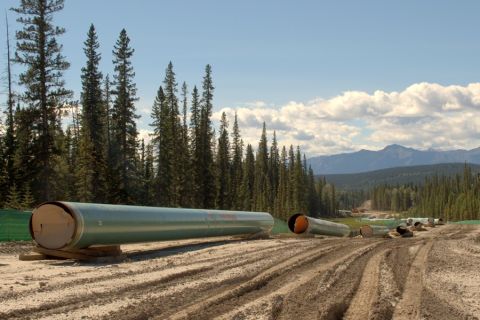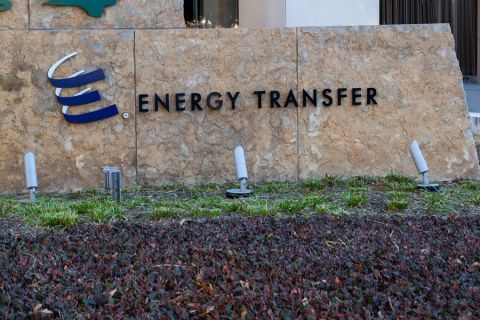Flying mammals, snakes and confused landowners are just a few of the challenges the midstream faces as it adds infrastructure to the Marcellus and Utica plays, participants in a panel discussion at Hart Energy’s Marcellus- Utica Midstream conference agreed. The panelists also emphasized the industry must reply vigorously to false accusations from foes who will not be placated. Robert A. Riess Sr., president and chief executive of Sheehan Pipe Line Construction Co., discusses his company with Hart Energy’s Marcellus-Utica Midstream Conference crowd.
Focused on environmental, legal and stakeholder topics, the panel agreed progress has been made, but there are still multiple issues to resolve in a region where the energy industry is regarded as a new thing and little understood.
Ken Komoroski, partner-in-charge with Fulbright & Jaworski’s Pittsburgh office, discussed environmental topics including the brown bat, a topic so broad “it might end up taking up the whole session,” he observed. The bats have been plagued with a poorly understood fungus that has caused the native species to drop sharply in numbers. The issue impacts multiple issues and land-use topics, not just the energy business.
“The industry does a fantastic job of hiring professionals to make sure that the concerns for endangered species are legitimately addressed, Komoroski said. “But then the actual details for things like bats—where they’re nesting, and seasons when they’re procreating—you’ve got to do the (environmental) studies at particular times and consider what their habitats are.”
Adding protections for additional species, even rattlesnakes in some cases, could further complicate permitting for rights-of-way and plant sites, he added.
Dealing with the public, particularly landowners, can be a challenge since there’s little experience with the oil and gas business in Appalachia and the Midwest, said Kerry Galvin, senior vice president and general counsel for Valerus.
“The problem is the same problem we have everywhere, there’s a lot of misinformation,” Galvin said. “So to the extent that landowners and the community take the time to really educate themselves about what’s going on, I think there’s a really good relationship. But there are always, you know, the people who are going to protest and dispute what’s going on. So one of the things that we really try to do is make sure our employees have as much information as possible, so that there are responsible interactions with the communities, and I know that’s true of our customers as well.”
Legislation and regulatory standards pose a problem here as much as anywhere, said Tom Stewart, executive vice president of the Ohio Oil and Gas Association. Stewart told the conference the industry is “getting involved in the regulatory debate that’s going on in Ohio as the Utica’s starting to ramp up. I’ve always been of the view that Ohio has a very, very good regulatory structure and it’s a great place to operate.”
But midstream operators should not confuse it with the more rural Pennsylvania and West Virginia.
“The one difference is that in Ohio, the population density is so much more,” he added. “One of the conversations we had with one of the larger players initially coming into Ohio was our views on what to expect.” He replied to the operator that “you’re always going to be close to a home, no matter where you think you are, no matter how rural you think you are. You’re always going to be in some kind of dense area.” That requires a different perspective on interacting with the public, Stewart said.
Getting along with government leaders and the public is good, Stewart said, but he added the industry should not hesitate to reply to false accusations and untruths.
“Our survival depends upon our success,” he added. “It depends upon aggressively fighting back. My biggest criticism of how state governments, and in large part the industry, do business is that too often they think in terms of appeasement. In some way, we believe we can make people who hate our business like us if we somehow acquiesce. I don’t think that gets you anywhere, because my view is no matter how much good you do, you can never do good enough for these folks. They simply want you to stop producing affordable, large quantities of oil and gas. It doesn’t fit into their business plan. We need to recognize that.”
Recommended Reading
Report: Crescent Midstream Exploring $1.3B Sale
2024-04-23 - Sources say another company is considering $1.3B acquisition for Crescent Midstream’s facilities and pipelines focused on Louisiana and the Gulf of Mexico.
For Sale? Trans Mountain Pipeline Tentatively on the Market
2024-04-22 - Politics and tariffs may delay ownership transfer of the Trans Mountain Pipeline, which the Canadian government spent CA$34 billion to build.
Energy Transfer Announces Cash Distribution on Series I Units
2024-04-22 - Energy Transfer’s distribution will be payable May 15 to Series I unitholders of record by May 1.
Balticconnector Gas Pipeline Back in Operation After Damage
2024-04-22 - The Balticconnector subsea gas link between Estonia and Finland was severely damaged in October, hurting energy security and raising alarm bells in the wider region.
Wayangankar: Golden Era for US Natural Gas Storage – Version 2.0
2024-04-19 - While the current resurgence in gas storage is reminiscent of the 2000s —an era that saw ~400 Bcf of storage capacity additions — the market drivers providing the tailwinds today are drastically different from that cycle.




